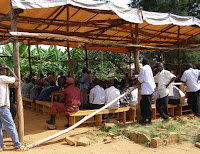By Rwanda News Agency
Thursday, 25 March 2010
Photo: A Gacaca court in session but no relations to this case.
Kigali: Controversy still mares the Genocide conviction of opposition politician Mr. Ntawangundi Joseph – in that at some stage he is fiercely contesting some charges but also accepting others. A weeklong marathon Gacaca court sitting in eastern Rwanda has sentenced him to a reduced term, but not without provoking more questions.
The drama-filled re-trail of Mr. Ntawangundi, who was an assistant for Victoire Ingabire Umuhoza, the United Democratic Forces Inkingi (UDF) chief ended Wednesday evening with a 17-year conviction. The original 2007 conviction was 19 years, and the panel of Gacaca judges did not explain why that had been reduced.
Mr. Ntawangundi’s file stated that he was the Principal of the Agro-veterinary school of Gitwe in Eastern province (EAVE-GITWE) at the time of the Tutsi Genocide and that he organized massacres of Tutsis in the institution. The judges found Mr. Ntawangundi guilty of also taking part in the killings himself.
However, all through the re-trail which started last week, the defendant explained that he never was the head of that school. He added that he was in Sweden during the genocide. Then what could be considered a bombshell, on March 19, he supposedly wrote a letter to the Gacaca panel making a U-Turn.
Amid a surprised crowd intently listening to the proceedings of the final day of the trail, the Gacaca panel said the defendant had accepted the charges, and that he was indeed at the said school during the massacres. Mr. Ntawangundi apparently in the letter also pleaded for forgiveness from the Gacaca panel.
But that was not the end of the case. As required by the Gacaca court system, before sentencing, the defendant is given time to say something. In a soft-spoken tone – like it had been through the trial, Mr. Ntawangundi publicly confirmed that the person mentioned in the case was indeed him.
He also confirmed that he was at the school during the massacres, but added he had worked there for a short time. Mr. Ntawangundi also said he accepts responsibility for genocide crimes committed by his staff.
Around 20 witnesses had testified having seen the accused when the massacres took place. Amongst them, one presented himself as a former student, one said she was Mr. Ntawangundi's servant and another one asserted she was his former partner. Other confessed killers themselves confirmed that the defendant “worked with us” – meaning killed.
Mr. Ntawangundi also had disowned a woman who claims she has a 15-year old child whom she believes is their child.
However, in his last words before the verdict was read, Mr. Ntawangundi stunned the session when he denied killing anybody using his own hands. Speaking slowly and guardedly, he also denied having supervised anybody doing the killing.
According to him, he had been at the school for a short time and had not known well all the people working there by the time the Genocide started.
In a lengthy presentation of his final defense as about eight of his accusers looked on, Mr. Ntawangangi admitted that he indeed saw some of his staff killing Tutsis but that he had not given them any orders. I did not have any control over the killers, he said.
After the defense of his acts, the Gacaca judges led by Mr. Celestin Turinabo went into a closed-door session which also lasted about two hours to decide on the verdict.
On return, presiding court leader Mr. Turinabo said that Mr. Ntawangundi was guilty of two levels of Genocide – on acts he committed as an individual, and for failing to reign in his staff as they rampaged killing Tutsis. The judge president went through the details of the case and eventually sentenced Mr. Ntawangundi to 17-years.
Though with a reduction of two years from the original sentence in absentia of 19 years, the Gacaca panel did not say why it had reduced the sentence. Speculation remained with those attending the proceedings who suggested that probably Ntawangundi’s letter had played a part.
Now detained in Kibungo's Central prison, Joseph Ntawangundi was arrested in February on the grounds of a judgment delivered in 2007 by a Gitwe Gacaca court. The tribunal sentenced him in to 19 years in jail for complicity in the mass slaughter. He was allowed to ask for a rehearing trial as he had been judged as he lived in Europe.
Despite standing by her assistant, opposition party chief Ms. Ingabire was recently forced to withdraw her support. In a press release posted on February 8 on the FDU-Inkingi website, Ms. Ingabire claimed that her assistant was not present in Rwanda during the genocide.
The website read: “Joseph Ntawangundi left Rwanda in 1986 for studies in Poland (Wroclaw), returned to Rwanda in 1992 and worked in Kigali (CESTRAL). In 1993, he left Rwanda for ICFTU - AFRO (International Confederation for Free Trade Unions, African Regional Organization, NAIROBI, Kenya) as a Research and Training Officer until 2002. During the genocide, Mr. Joseph Ntawangundi was attending, on behalf of the ICFTU – AFRO, a 2-month training course in Sweden (GANGNEF) and returned to Kenya".
However, when the situation turned against her version of events, she changed her defense, instead saying Mr. Ntawangundi had not revealed his past to the party.
Following the verdict, the guilty Ntawangundi was taken back to jail and it is not clear if he will appeal because he still has several layers above.
Related Materials:
Ingabire’s assistant pleads guilty, seeks forgiveness

No comments:
Post a Comment